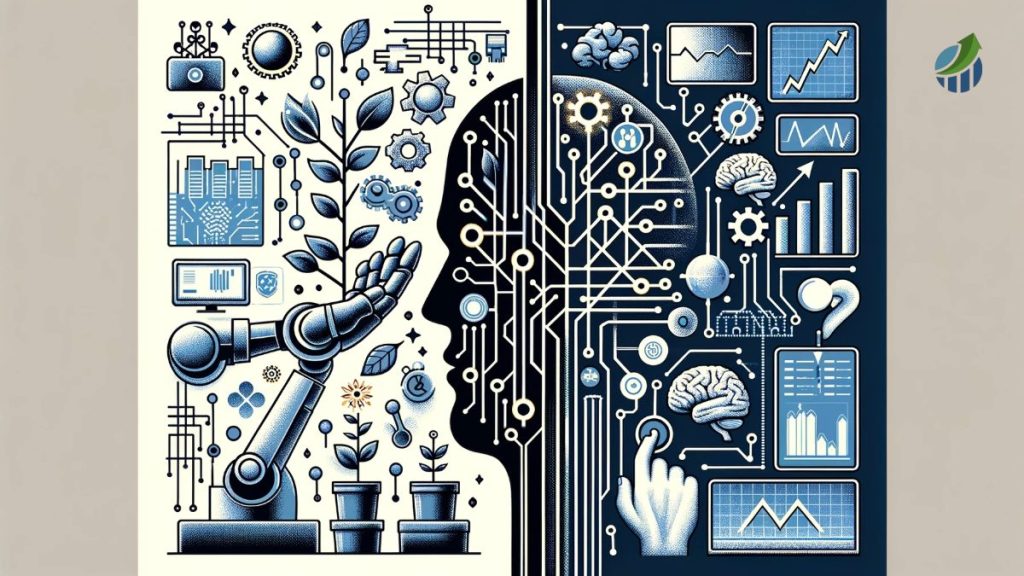In the wake of a rapidly evolving AI landscape, economic experts find themselves at the forefront of a revolution. The International Monetary Fund (IMF) and other leading economic thinkers are diving deep into understanding and shaping AI’s influence on the global economy. This is clearly because Artificial Intelligence (AI), once a subject of science fiction, is now a central theme in economic discourse, promising substantial shifts in productivity, job dynamics, and global economic patterns.
The Dual Nature of AI
AI’s foray into diverse sectors, ranging from healthcare to agriculture, and finance to education, is without a doubt a double-edged sword. On one side, there’s a world brimming with innovation and efficiency; AI algorithms diagnosing illnesses with precision, smart farming techniques boosting food production, and AI-driven financial models predicting market trends. However, this bright side is shadowed by pressing concerns and economic challenges. The spectre of job displacement looms large, misinformation proliferates unchecked, and societal inequalities threaten to widen. This paradox is not just a matter for experts to decipher; it demands a nuanced understanding from those who steer our economies.
Erik Brynjolfsson from Stanford University encapsulates this sentiment perfectly, “AI’s impact will be a consequence of many things, including technological and policy decisions made today.” This statement isn’t just a throwaway line; it’s a profound recognition of the weighty role current decisions play in carving out our economic future.
Governing AI has also emerged as a high-stakes global challenge, akin to a complex game of chess where technological supremacy is the ultimate prize. Ian Bremmer of Eurasia Group expresses the enormity of the challenge, stating that governing AI is “among the most difficult challenges in coming decades.”
This is primarily due to the intricate nature of AI governance, which mixes in ethical considerations, economic impacts, and geopolitical tensions. The rapid pace of AI development often outstrips existing regulatory frameworks, leading to a significant gap in governance. This gap is not just a technical issue but encompasses ethical use, privacy protection, and the prevention of misuse. As AI continues to evolve, its governance demands continuous adaptation, collaboration, and a forward-thinking approach.
IMF’s View on AI: Risks & Opportunities
Kristalina Georgieva of the IMF offers a more nuanced and balanced perspective to the conversation about AI. Her insights resonate with the dual nature of AI as both a disruptor and an enabler. Her view doesn’t shy away from acknowledging the potential challenges AI poses to job security. The threat of automation and the displacement of traditional roles is a tangible reality in industries increasingly dominated by smart machines and algorithms. This acknowledgement is vital, coming from an institution that plays a pivotal role in shaping economic policies and perspectives globally.
Yet, in the same breath, Georgieva highlights AI’s incredible potential to rejuvenate global productivity and economic growth. AI’s capacity to optimise processes, generate new insights through data analysis, and drive efficiency is unparalleled. It’s this aspect of AI that holds immense promise for spurring economic development and innovation across various sectors. This view reflects a deep understanding of the intricate balance that needs to be struck in harnessing AI’s potential while navigating its challenges. It’s a stance that urges policymakers and economic strategists to look beyond the immediate disruptions and recognise the long-term benefits AI can bring to the global economy.
The AI Impact on Jobs and Income Inequality
The IMF’s report on the impact of AI on jobs paints a picture of significant transformation. With an estimated 60% of jobs in advanced economies at risk of being affected by AI, there’s a pressing need to address the implications of this technological shift. The report doesn’t just stop at highlighting the risk; it delves into the complexity of the AI-jobs equation. As Georgieva aptly puts it, “the future of work in an AI-driven world isn’t unidimensional. Your job may disappear altogether or artificial intelligence may enhance your job.”
The potential of AI to render certain jobs obsolete is a stark reality, particularly in sectors where routine tasks can be easily automated. However, this is only one side of the coin. The other side is where AI acts as a catalyst, transforming jobs into more skilled and productive roles. This transformation could lead to the creation of new industries and opportunities, reshaping the workforce landscape to accommodate more advanced and diverse skill sets.
Georgieva’s statement brings to light the duality of AI’s impact on employment and income inequality. On one hand, there’s the risk of widening the gap between the skilled and unskilled workforce, exacerbating income disparities. On the other, there’s the opportunity to elevate the nature of work, making it more innovative and intellectually stimulating. This duality presents a unique challenge to economic experts and policymakers: to devise strategies and policies that mitigate the risks of AI-induced job displacement while maximising its potential to enhance job quality and productivity.
Bridging Global Gaps: Addressing AI Disparities
The IMF’s warning of an emerging digital divide highlights a critical concern in AI’s global impact: the growing disparity between developed and developing economies. This divide extends beyond technology access, reflecting deeper issues of innovation capacity and equitable benefit distribution. Developing countries, with limited digital infrastructure and constrained R&D capabilities, on top of economical issues such as high inflation rates, risk falling behind in the AI race, exacerbating global economic imbalances. Addressing this divide requires global efforts, including investments in digital infrastructure, education, and policy inclusivity, ensuring developing countries have a say in AI governance.
The challenge lies in crafting locally relevant, sustainable solutions that are globally informed. By tackling these disparities, AI can transform into a tool for inclusive growth, fostering a more equitable and stable global economy. This approach is not just about fairness but also about ensuring a balanced and prosperous future for all.
Endnote
As AI continues to shape the economic landscape, it’s clear that the role of economic experts is going to become increasingly vital. They will be tasked with understanding AI’s multifaceted impacts, guiding policy decisions, and navigating the balance between innovation and regulation. Thus, the importance of proactive and informed policymaking in harnessing AI’s potential for economic growth, while addressing its challenges, is at a crossroads, one that will need to be navigated sooner rather than later.
Author Profile

- With a keen eye for detail and a passion for finance, Joshua is an accomplished writer. His expertise lies in simplifying complex financial concepts into understandable, engaging content that resonates with both industry professionals and everyday readers. Joshua’s portfolio spans a range of topics, from tips and investment strategies to in-depth analyses of market trends and alternative cryptocurrencies.
Latest entries
- February 5, 2024SatoshiThe Potential Ramifications of the COPA vs. Wright Trial
- January 18, 2024Global EconomicsIMF Warning: AI’s Economic Implications & the Future of Work
- December 31, 2023CryptoCrypto 2024 Outlook: A Dynamic Year Ahead?
- December 27, 2023CryptoPolygon (MATIC) Soaring by 22%: What’s Driving this Scalability Pioneer?




